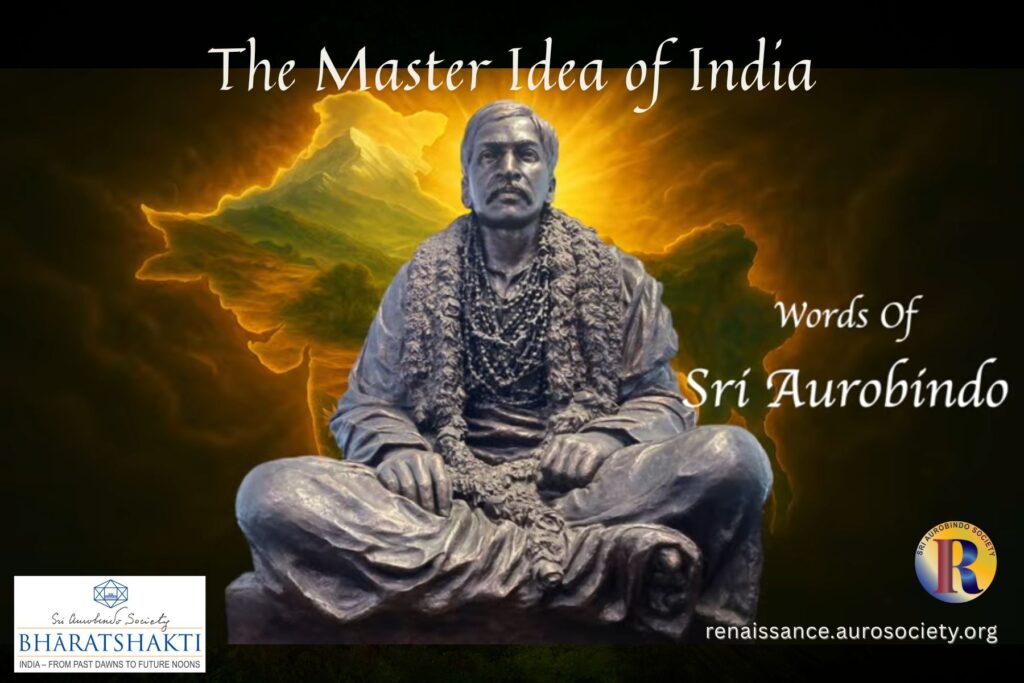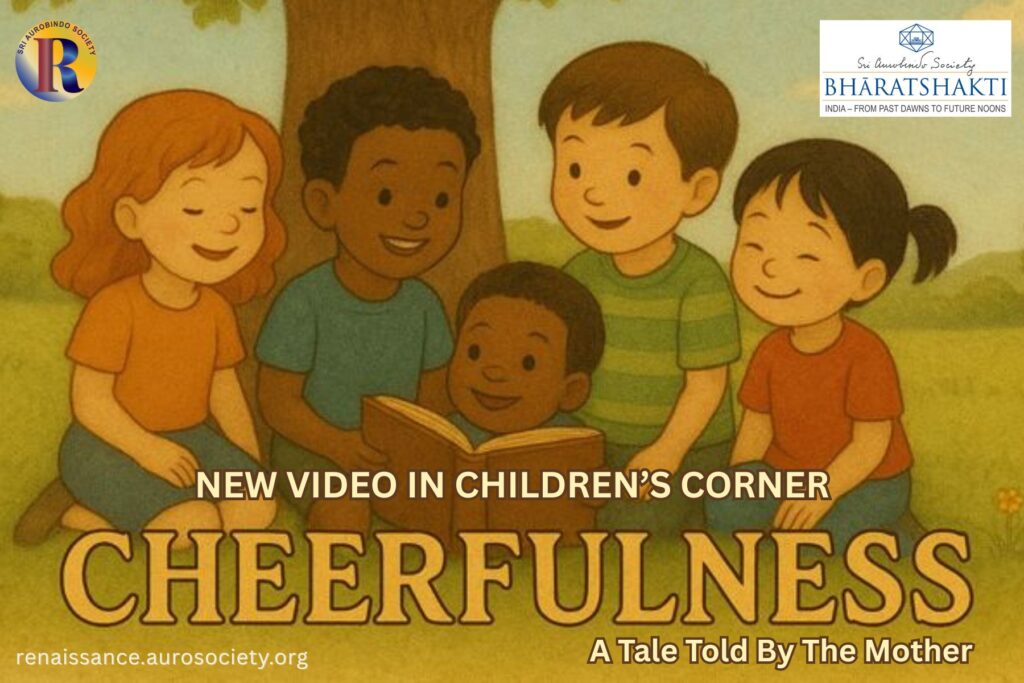Volume II, Issue 5
Author: Beloo Mehra
Editor’s Note: A deeply inspiring conversation with a three-member team from Bengaluru-based Creative School. Inspired by the Integral Education teachings of the Mother and Sri Aurobindo and other spiritual masters, this institution is described by its members as a conscious community and holistic school for children, parents and teachers.

“The aim of education is not to prepare a man to succeed in life and society, but to increase his perfectibility to its utmost.”
(The Mother, CWM, Vol. 12, p. 120)
For this month’s Insightful Conversation section, we are happy to bring a deeply inspiring conversation on a topic close to the heart of most Indians — education. What is the true purpose of education, what kind of education will help our children blossom to their fullest potential, how can education address the development of every part of their being, how can it facilitate each individual child’s growth at a pace that is most natural to him or her and also most authentic and individualised? More and more thinking parents of today are interested in these and other such questions.
In addition to these, our conversation with Ms. Jayashree Ashok, Mr. B. Ashok, and Ms. Reshma Madhusudan from Creative School, Bengaluru, throws significant light on another set of important questions — what is the role and place of teachers and parents in the educational journey of a child, can our educational spaces become holistic centers that also facilitate the growth and transformational journeys of parents and teachers? Can educational contexts be re-envisioned and redesigned as sacred spaces where the most sacred work of facilitating a soul’s journey through a deeply conscious process of learning-teaching takes place? How may we truly honour teachers’ work, something which it truly deserves? How can schools help parents become more authentic and conscious facilitators in their children’s growth, and in that process grow as human beings and discover their own deeper selves?
Inspired by the Integral Education teachings of Sri Aurobindo and the Mother as well as incorporating wisdom and guidance from several other spiritual masters, Creative School is now in its twelfth year and is spoken of by its founding team as a conscious community and holistic school for children, teachers and parents.
Our one-hour-plus-long conversation brought out many significant aspects which make this school a unique educational institution — perhaps ‘institution’ is not the appropriate word to describe this sacred space which the school team and everyone involved with it are trying to create in a very conscious way. This sacred space for learning and teaching is highly progressive — in the right sense of the word — and simultaneously deeply rooted in the Indian vision of the true aim of life and education, namely, to help the child, the soul-in-evolution, gradually become more aware and conscious of all that he or she is in deeper self. This is spoken of by our rishis as: Ātmanam viddhi or Know thyself.
The school was born of a vision which Jayashree had while immersed in her spiritual practice. This vision eventually led her and her husband Ashok to leave their senior professional positions and relocate with their two daughters from the US to India and work towards creating a space which will allow them to grow as conscious parents and facilitate their children’s growth and learning in a holistic manner.
While still in the US, both Jayashree and Ashok had been volunteering in the field of Indian education for many years, learning about and working at village-level education in India. Their visit to Auroville and learning about Integral Education was most transformative and opened up a whole new understanding of the true purpose of education. At some point Reshma Madhusudan, who was also working in the US and had been looking for a deeper purpose in life, joined them in their education related voluntary work.
Soon, their passion and purpose brought them all to Bengaluru, India where Creative School was born with 16 students, including their own children, and 8 teachers.
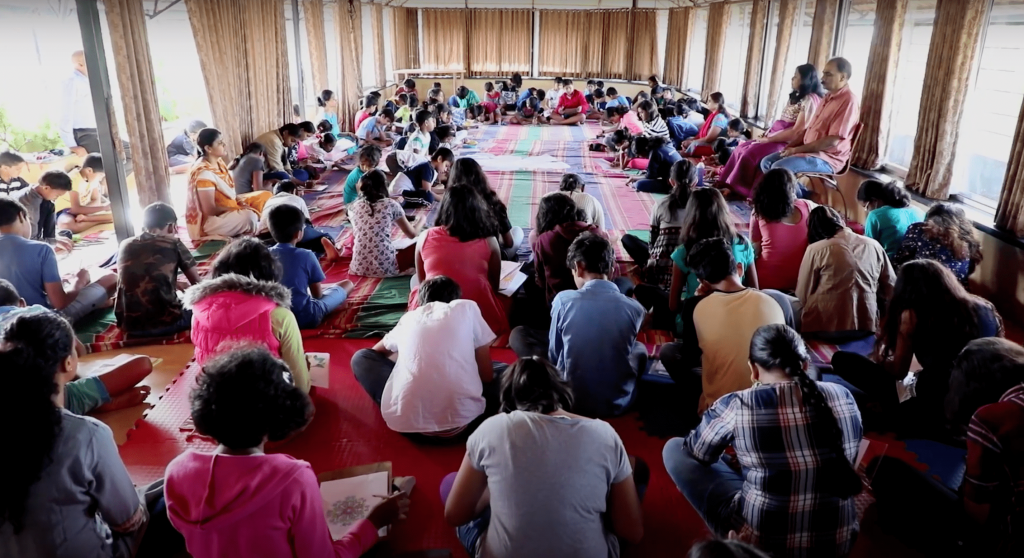
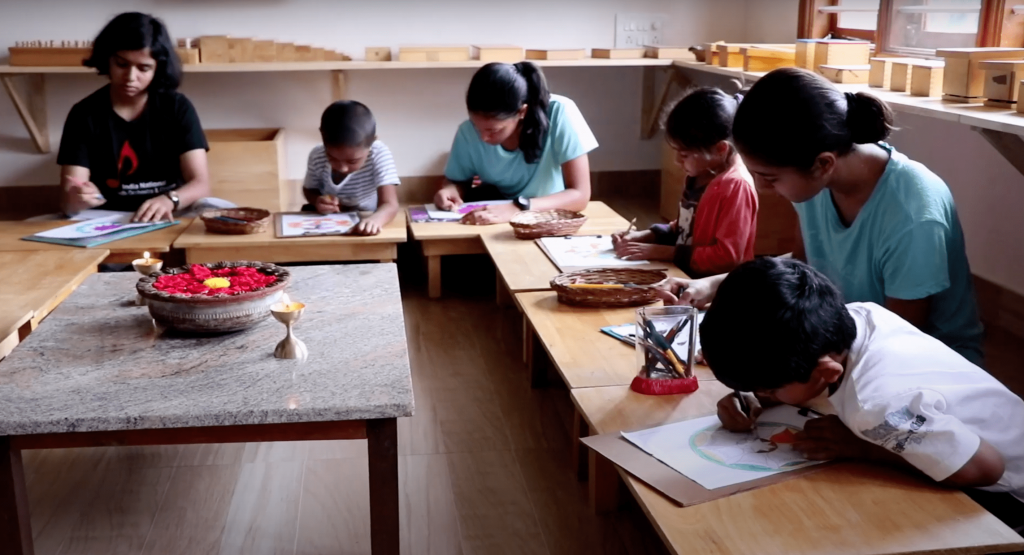
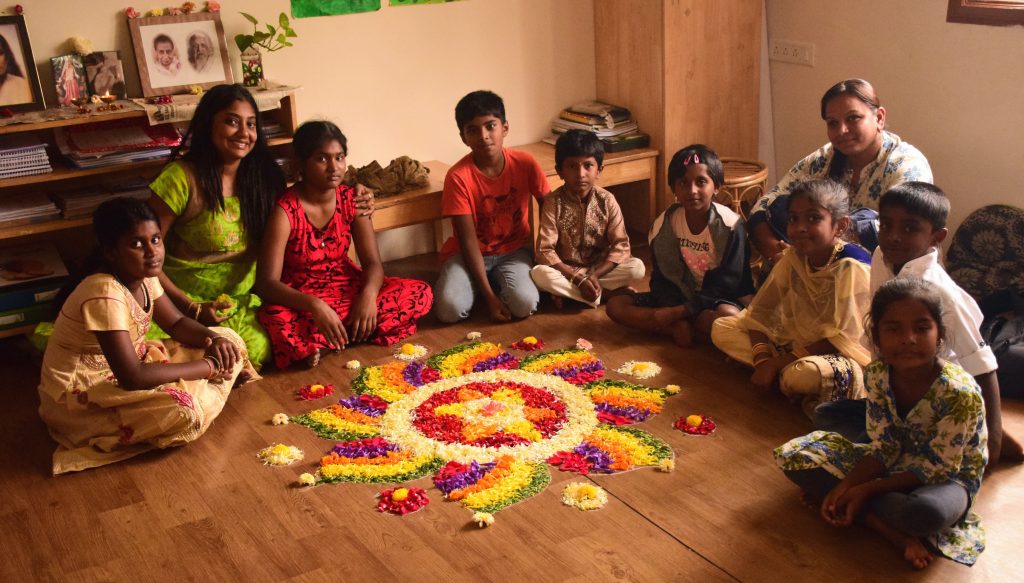
The conversation brings to light several significant details about the school’s overall philosophical and pedagogical approach. Jayashree and Reshma share about Sacred Classroom, Sacred Curriculum, Co-creating Sacred, and Four-step Learning Process — all of which are at the heart of what goes on at Creative School. Teaching is looked upon as sādhanā at the school, so inner work of teachers is given a great significance there.
Soul-based education is only possible when teachers are constantly working to get in touch with their psychic being and this takes time and patient inner work. Hence, one of the most significant aspects of Creative School is the emphasis it gives to teachers’ inner work which is considered the most important part of what they do at school.
This is facilitated by making space and time for teachers’ reflection during the work-day (wisdom circles as they are called), as well as offering regular practice time for meditation, prānāyāma and other inward-turning practices. This is completely in line with the Mother’s and Sri Aurobindo’s guidance according to which the teacher’s influence makes the biggest difference in a child’s learning. The inner state which a teacher brings to his or her classroom sets up the overall learning environment in the classroom.
Jayashree who has authored The Sacred Trilogy, shares the seven essential principles or pillars which form the core of Sacred Classroom, which a teacher needs to keep in front of her. These are: 1) Unconditional love and compassion; 2) Being in a state of awareness of themselves and children; 3) Abundance, which implies an inner sense of prosperity, an expansive consciousness which helps them develop faith in the innate ability of the child to learn; 4) Respect, which is bidirectional — both from teachers to children and vice versa, and also children respecting themselves and teachers respecting themselves; 5) Mirroring, which emphasises for the teacher that what they experience in classroom is a reflection of what is inside them, that the inner and outer life are connected, and that bringing inner harmony will result in outer harmony in the environment; 6) Learning from challenges as the path to gradual self-mastery; and 7) Recognising and dropping the ego, which implies that teachers must remember to constantly practice this inner work of becoming aware of the play of ego in them, and consciously and humbly learn to dissolve that and grow in a deeper sense of inner freedom.
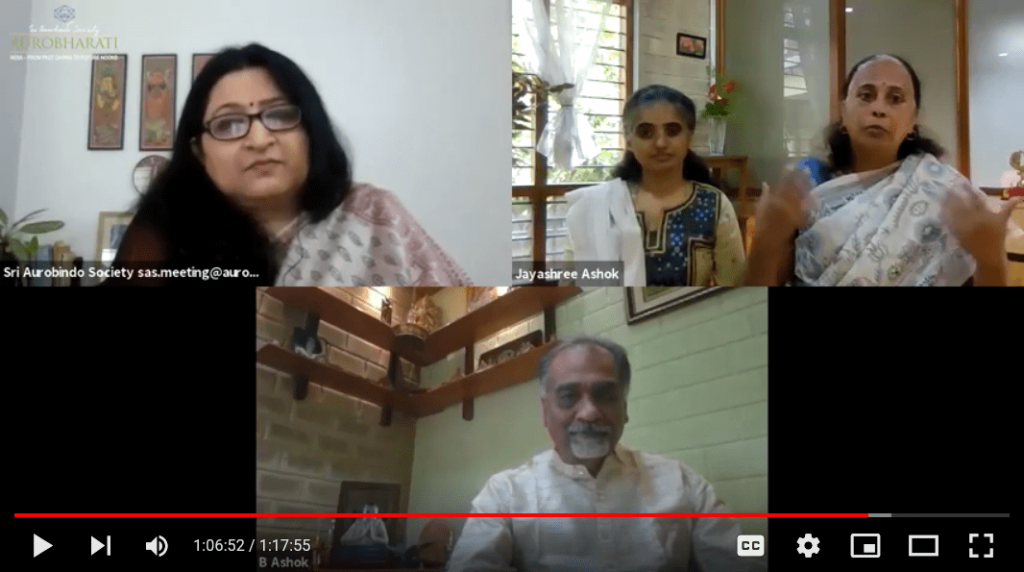
Much thought has also been given to creating sufficient time and space for children at Creative School to turn inward and find their own inner tuning and harmony which helps them prepare for fully participating in their learning. The Four-step Learning Process which includes Joyful Exploration, Digestion and Reflection, Mastery and Wisdom Application facilitates a self-paced and self-directed learning with gentle guidance and support from the teachers. Every class begins with an Opening Ceremony which harmonises the inner environment of the children making them ready for the work, and a Closing Ceremony which facilitates a silent reflection or assimilation and gratefulness.
The school follows a mixed-age grouping model. The curriculum is holistic and addresses physical, emotional, mental, psychic/spiritual and social parts of the nature. It is not presented in an artificially linear manner, it rather follows the heart of the child. In lower age-groupings a broad-based curriculum is offered, and it gradually becomes more closely aligned with the growing learner’s interest and passion. Teachers closely observe the children’s evolving interests and constantly revamp their curriculum accordingly. Design centers with appropriate learning activities and materials which address each of the four steps of the Four-step learning process are created in each classroom. This ensures that each child feels comfortable and secure to work at his or her own pace, and necessary skills are developed as a result of this organic learning process.
Considerable attention is paid to create beautiful, harmonious classrooms, bringing in elements from Nature such as flowers. Diyas and incense are also used to bring a sense of sacredness, calm and peace in the space. Children and teachers collaborate in this work so that they may have a sense of ownership of their work spaces and in the process also develop a keener sense of aesthetics.
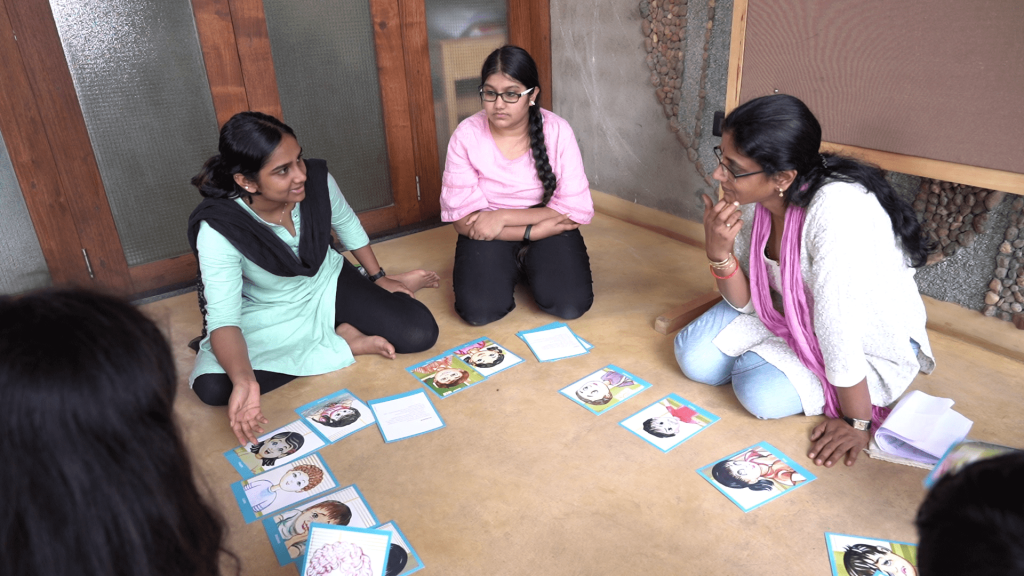
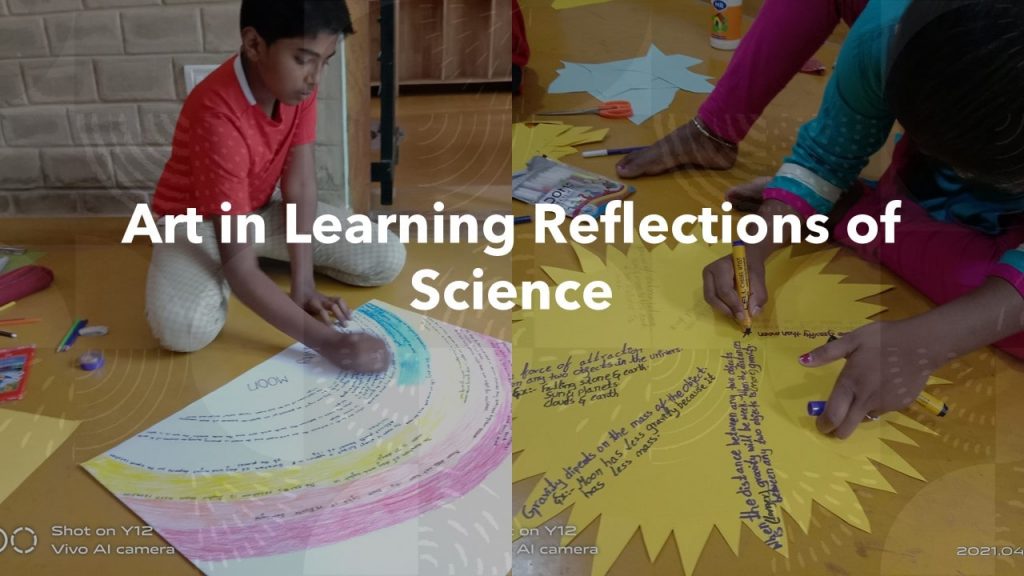
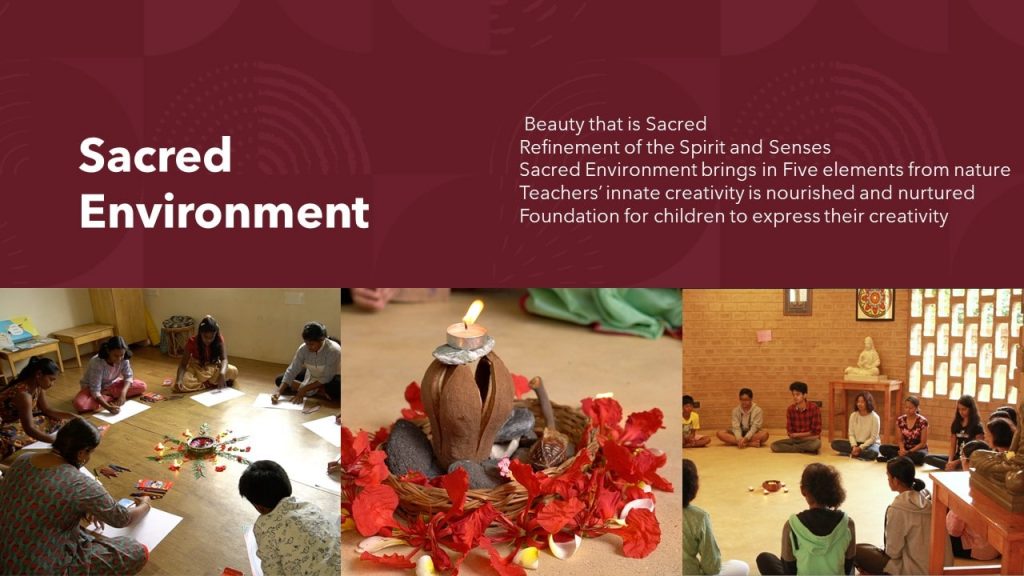
During the conversation we also discussed how the school works with parents to facilitate their growth journeys as conscious individuals and conscious parents. Through Prajña Wisdom Center, the school offers several courses which helps parents look within and go through an inner de-conditioning process. This helps them recognise how they may be bringing their own baggage, including that of their own schooling experience, when they set their expectations on their children’s academic learning and pace, instead of allowing them to blossom at their own pace and in their own unique way.
During the last two years, the Creative School team has been invited to offer teacher training workshops for government school teachers in Karnataka and Odisha. The insights and tools they shared during these workshops — offered to hundreds of teachers in both the states — were highly appreciated by the teachers. The biggest feedback they received was that the teachers felt that this was the first time their work was honoured and their needs for personal fulfillment and conscious growth as individuals were recognised and addressed in the context of their professional work as teachers.
It was pointed out that that today India is going through an interesting churning and more and more people are demanding a more holistic approach to education. And the Creative team feels grateful to have an opportunity to work — one child at a time, one teacher and parent at a time — towards a new future of India and humanity. They acknowledge that ultimately the biggest transformation they witness through their work at Creative is their own, and this is what makes their work karmayoga and a sacred offering to the Divine.
Watch the full conversation:
About our guests:
Jayashree Ashok is Co-founder and Director of Creative School and Prajña Living Wisdom Centre. She has extensive experience in the area of education. She has been deeply inspired by the teachings of Sri Aurobindo and The Mother on Integral Education. Jayashree’s inner growth led her to experience a deep spiritual transformation. She has more than two decades of experience working with several healing modalities including Rebirthing Breathwork and Energy Healing methods.
B. Ashok is Co-founder and Trustee of Creative School. His professional education is from IIT Madras and University of Wisconsin-Madison as a computer scientist. Ashok currently teaches at Creative School while continuing to work full-time as the Director of Development at Microsoft Research India. He is passionate about music, basketball, numbers & word puzzles, technology, and humor.
Reshma Madhusudan is Principal and Curriculum Coordinator at Creative School. She enjoys being a teacher, teacher trainer, curriculum coordinator, and healer. With Jayashree’s influence she was led to the teachings of several spiritual masters. She has fully embraced practical spirituality as a way to experience ‘aliveness’ after a transformative journey through illness. Her deep interest in Sri Aurobindo and The Mother’s work on Integral Education, and Steiner’s works in Waldorf Education has moulded her thoughts and practice in the area of holistic learning.

